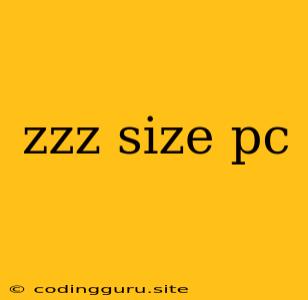What is the Ideal PC Size for Your Needs?
When choosing a computer, one crucial factor to consider is its size. A smaller computer can save space and be more portable, while a larger system may offer better performance and expandability. So, how do you decide what size PC is right for you? Let's break down the different options and their pros and cons.
Desktop PCs:
Tower:
Tower PCs are the largest and most traditional desktop form factor. They often come with multiple drive bays, allowing for plenty of storage space and expansion possibilities.
- Pros: Excellent for high-performance gaming, content creation, or demanding applications due to their generous space for powerful components.
- Cons: Can take up considerable space, are not very portable, and generally cost more than smaller options.
Mid-Tower:
Mid-towers offer a balance between size and capacity. They can accommodate powerful components but are still relatively compact.
- Pros: More space for expansion than a mini tower but smaller than a full-size tower, offering a good compromise for most users.
- Cons: May still be too large for some users, especially those with limited desk space.
Mini Tower:
Mini towers are a smaller version of mid-towers, sacrificing some expandability for a more compact footprint.
- Pros: More compact and portable than larger towers, offering a decent balance between size and performance.
- Cons: Limited space for expansion, especially for users who want to add multiple hard drives or high-end graphics cards.
All-in-One (AIO) PCs:
AIO PCs integrate the computer components into the monitor, creating a space-saving design. They are perfect for minimalist setups and limited space environments.
- Pros: Compact and sleek design, ideal for small spaces, and typically more affordable than tower PCs with comparable features.
- Cons: Limited expandability, less upgrade potential compared to tower PCs.
Small Form Factor (SFF) PCs:
SFF PCs are significantly smaller than traditional tower PCs, often resembling a small box or cube. They offer portability and compact size for users who want to minimize their desk space.
- Pros: Extremely compact and portable, great for space-saving setups.
- Cons: Limited expandability, typically come with less powerful hardware options than larger PCs.
Mini PCs:
Mini PCs are the smallest form factor, often the size of a small book or even smaller. They are perfect for minimalist setups or as a home theater PC.
- Pros: Ultra-compact, portable, and often energy efficient.
- Cons: Very limited expandability, often come with less powerful hardware options.
Choosing the Right Size:
The right size for your PC depends on your specific needs and preferences. If you need a lot of space for hardware, a tower PC may be your best choice. But if you prioritize portability and a small footprint, a mini PC or SFF PC may be more suitable. Here are some key factors to consider:
- Space: How much desk space do you have available?
- Performance: What are your computing needs? Do you need a powerful PC for gaming, video editing, or other demanding tasks?
- Budget: Smaller PCs are generally more affordable than larger systems.
- Expandability: Do you need to add more components in the future?
- Portability: Do you need a PC that is easy to move around?
Conclusion:
The ideal PC size depends on your unique needs. Whether you prefer a large, powerful tower or a small, portable mini PC, there is a perfect size for everyone. By considering your space constraints, performance requirements, budget, expandability needs, and portability desires, you can choose the right PC that fits your lifestyle.
